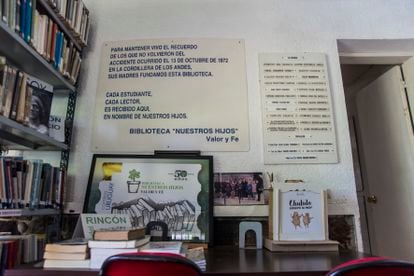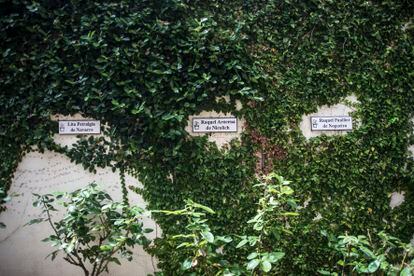In December 1972, the news spread around the world: a group of Uruguayan twenty-somethings were still alive after being lost for 72 days in the mountain range, after the plane they were traveling in to Chile crashed. Shortly afterwards it was learned that 16 of the 45 people on board had survived. Their relatives were in suspense until the names of the living boys were finally known. Joy spread in 16 homes in Montevideo, and the event was baptized “Miracle of the Andes.” Also during those same hours, desolation settled among the families of those who did not suffer the same fate. Far from the media noise that spoke of a miracle, each one mourned the tragedy on their own. Thus the days and weeks passed, until the mother of one of the young men decided to leave the house and give some other meaning to the grief that was sinking her.
In February 1973, Selva Ibarburu, mother of Felipe Maquirriain, who died at the age of 22 due to the blows suffered in the accident, decided to visit the families who were in the same situation. Ibarburu went house to house and proposed a meeting, because she did not want to go through that alone and locked up. Twelve mothers brought her note and met in Carrasco, the residential neighborhood of Montevideo to which all the protagonists of this story belong. “What can we do for our children?” they asked themselves. One of them, Inés Valeta, a teacher and mother of Carlos, who died in the Andes at the age of 22, suggested creating a library to honor her children, her students. They all agreed. They began the procedures, they looked for a place and with a loudspeaker they went out to collect books. In August 1973, less than a year after the accident, the 13 mothers formalized the creation of the Our Children Library.
“In the library we found support that we didn't have anywhere else,” Raquel Arocena, 96, founder of this initiative more than five decades ago, tells EL PAÍS. She is the only one still alive of the 13 mothers who defied the social mandate of the time: to stay home and bear the loss alone. In her case it was Gustavo Coco Nicolich, her 20-year-old son, a Veterinary Medicine student and member of the Old Christians rugby team that was traveling to Chile. “My father, who was an older man, said that the library was absurd,” she recalls. “It was really amazing,” she continues, “everything we needed was in that place.” After a pause, she adds: “We needed tranquility, we needed understanding, we needed friendship.” It was the best tribute to Gustavo, her mother maintains, because he had been a great reader since he was little. “It would have helped him,” she continues.
The Nuestros Hijos library operates in Carrasco, on land donated by the Municipal Administration of Montevideo. “To keep alive the memory of those who did not return from the accident that occurred on October 13, 1972 in the Andes mountain range, their mothers founded this library. “Every student, every reader, is welcomed here on behalf of our children,” reads a welcome sign. Almost 25,000 books, a children's reading corner and computers that are used in computer workshops aimed at a total of 20 young people share space in three rooms. Four job placement workshops are also taught here and, through scholarships, textbooks are given each year to 125 low-income students.
Since the beginning they have been financed with the contributions of members, currently 500, as well as with donations from individuals and companies. The most recent came from the hand of The Snow Society, Juan Antonio Bayona's 2023 film, which gave the library the 50,000 euros obtained from the audience prize at the last San Sebastián Festival. “We had a pending matter with the families of the deceased, who are grouped together in a Nuestra Hijos foundation, which helps children with difficulties in accessing culture and reading,” argued the director, who visited the library in Montevideo in an emotional event that brought together many families.

In conversation with EL PAÍS, Stella Pérez del Castillo, sister of Marcelo, captain of the Old Christians who also died, maintains that the library was the “lifeline” for mothers, in times when psychological therapies were not common. “The mothers always said that at the beginning they talked 90% about the accident and 10% about the library,” she says. But little by little the initiative filled their lives: they looked for and obtained the books, they attended to the students and members, they organized the training workshops, and they managed the funds. “There were 13 women who felt exactly the same: the most horrible pain of losing a child. They wanted to do something in their name and for other students like them; They needed to get something useful out of the pain they felt. For my mother it became her second home,” she adds.
His brother Marcelo was 25 years old when the accident occurred and, like Nicolich, he died as a result of the avalanche that the group suffered 16 days after the plane crashed into the mountains. He died on October 29, the same day his father had died four years earlier. A born leader, Pérez del Castillo had taken charge of the organization of survival tasks and was a fundamental support when they had to make the most complex decisions. However, his spirits plummeted when they learned that the search for the plane had been suspended 10 days after the accident, as his colleagues at the airport acknowledged. documentary film The Snow Societyde 2007, directed by the Uruguayan Gonzalo Arijón.
For decades, Stella did not want to see any movies or read books or interviews that made reference to the tragedy that took her brother. “I thought it wasn't going to have anything positive for me,” she explains. She, too, had not planned to attend the screening of Bayona's film, although she had witnessed the filming a
t the old Montevideo airport that recreated the departure of the charter flight on which Marcelo traveled. Finally, she cheered up and saw her with one of her daughters. “I felt the anguish and helplessness that my brother felt. “He made me see his death in a sublime way,” she says emotionally. She agrees with the other family members that the film allowed us to establish a bridge with the survivors and enabled conversations that had not occurred before. In her case, she maintains, she unlocked emotions that she had entrenched. “It was magical,” she adds.

Raquel Arocena celebrates, at 96 years old, that the library is still going and with expansion plans in the hands of new generations. “We, the founders of the library, never believed that it was going to be such a wonderful work,” she says. With the donation of the film, they plan to increase the scope of the social work with a better location, increase training workshops and scholarships with textbooks. About 900 children and adolescents from all the neighborhoods of Montevideo visit the library during the year. Fifty years after its founding, Arocena does not hide her satisfaction at having ignored the bad omens that came to the mothers when they shared her idea. “The library was a fabulous help to everyone and continues to be today for many. It is part of our life,” she states.
You can follow EL PAÍS Education in Facebook and xor sign up here to receive our weekly newsletter.
Subscribe to continue reading
Read without limits
_
#Fifty #years #Nuestros #Hijos #library #mothers39 #tribute #return #Andes
